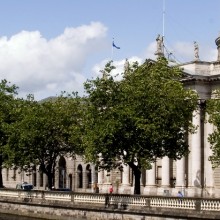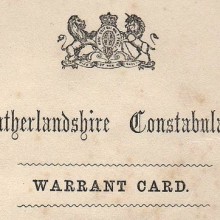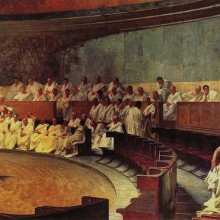Constitutional Law
Digital Rights Ireland: Application for a Trial of Preliminary Issue

In January 2012, in the case of Digital Rights Ireland Ltd. v The Minister for Communications & Ors., the High court referred certain questions to the CJEU (ECJ) under Article 267 TEU. In the events that happened the ECJ struck down or found invalid Directive 2006/24/EC in the course of the hearing of the referred questions. The High court is now hearing the parties (Digital Rights Ireland Ltd. and the Minister for Communications & Ors.) in the resumed proceedings, interrupted […]
Leviathan and greasy tills
Credit; tcd.ie In May 2011, Queen Elizabeth II, the Sovereign of the United Kingdom, was driven past our office. We saw her. Like other citizens of Dublin, we waved respectfully. We understand David Cameron, the UK prime minister, is also respectful of her. Nonetheless, she has to watch her step with him; he can politely direct her on important matters. Albeit he must be polite, he is not amenable to being curbed by her because she lacks the institutional capacity […]
Ideas and “aul pencils”
“The life of the law has not been logic; it has been experience.” So claimed Oliver Wendell Holmes. In fact this statement contains its own contradiction; it is an idea, and the life of the law is in ideas. It is impossible to understand the world, or even a part of it, without having an idea. An idea is an abstract concept. Take any word as an example; now put it in a sentence. Invariably, the meaning of the word […]
Back to School
Photo credit; Creative Commons Donald Trump is living proof that the relevant issue in the US presidential election race is education. His slogan “Make America Great” is a (double) solecism. It is great because of the Constitution of the United States. Article VI of the Constitution of the United States of America (the correct name of the country) provides; The Senators and Representatives before mentioned, and the Members of the several State Legislatures, and all executive and judicial Officers, both […]
“Dr. Livingstone, I infer?

Henry Stanley got things wrong when he met Dr. Livingstone. On meeting him, he records, he said; “Dr. Livingstone, I presume? The Oxford Dictionary indicates that “presume”, as used by Stanley, conveys he is supposing that something is the case on the basis of probability. On his own account, he was being absurdly careful. As Stanley well knew, white men in that location at that time were unknown. So, of course, the man he was meeting was probably Livingstone. However, […]
The National Risk Assessment for 2014

The Taoiseach has published the Draft National Risk Assessment for 2014. The good news is that, by implication, there will be another in 2015 and that it is open for public comments until the 30th June. The bad news is that, in briefly harking back to the past, it fails to correctly describe what really happened. Then there’s the tone; the authors never question the possibility that they are not competent to write the Assessment. Presumably, they followed the nostrum […]
Carry on…

In Damache v DPP, Ireland & the Attorney General, IESC [2101], (“Damache”) the Supreme court decided that Section 29(1) of the Offences against the State Act, 1939 (as inserted by s. 5 of the Criminal Law Act, 1976) was unconstitutional. The Section permitted a person, not independent of an investigation, to issue a search warrant for the purposes of the investigation. The court found that a police officer engaged in an investigation is not an independent person for these purposes and […]
Medical Negligence and “Doctor X”
In January 2008 we reported the publication of a book by an anonymous Irish doctor, detailing the failings of the Irish hospital system. See a report HERE. The doctor was running a website and was featured speaking on national radio. The website is now not to be found and the book is not readily available. Medical errors happen everywhere; they are not unique to Ireland. In the USA and the UK, the responsible authorities collect statistics to find out why […]
Judging judges
There are two big ideas current in modern law. One is expressed in the law of the EU; it is the freedom to do business. The other is the law generated in response to the Second World War; it is the law of human rights. There has been an effort to bring them together (and an effort to keep them apart). The effort to bring them together is in the Treaty of European Union and the Charter of Fundamental Rights […]
The Actio Popularis, Aarhus Convention and class actions in Ireland

Ireland currently has a limited form of class action. It is the “actio popularis”. It is not like the US form of class action; it is not of direct benefit to individual members of the public. They get the benefit when they are in the class that benefits from the judgment. They do not simply lodge their claim for compensation, say. The Irish courts have accepted “actio popularis” claims in only one such proceedings; Digital Rights Ireland Ltd. v The […]
